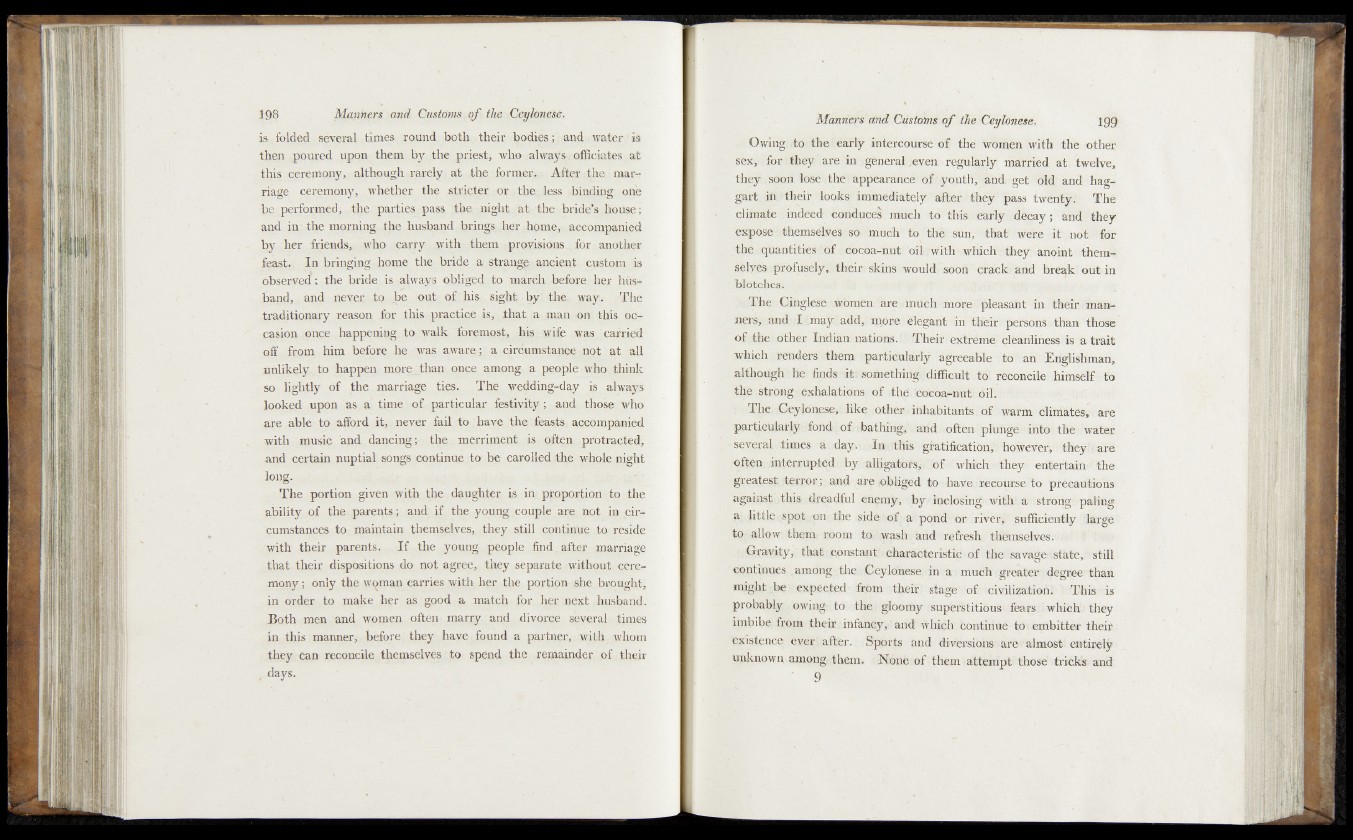
^ fo ld e d several times',,fuund bptlu their Jodies; -and, water1is
then .poured upon them. by ..the. ^priest, who ;always*/©J0Sciafces at
this cerempny, although -.rarely t at the fortner-H- Aftsh jibed marriage
ceremony, whether the stricter or )thn;.|lpss «binding ofie
he performed, the parties^, pass lthex night.'at^ the^bridid’s'house;
and, in;.the morning-,the .husband bring! ;h£r .home,*accompanied*
by h er fiends*;, j who carry .’with them /provisions.. fbr;,another
feust. In b rin in g home the bride a straiige.^aneient i t.custorn is
observed; the bride , is .-always obliged, to marclj. before;-her bust
.band, and never, Ju , be out; of :his. sight byA the- yrayy /The
traditionary reason fpj th is , practice is ,, th at a jnan on; this occasion
once , happening to walk '^remp^;,, yhi§Lv wife .was carried
off .from him before he was. aware;’ a circumstance-pot' at all
unlikely, to happen more^ than,, ppce among t<.a .people ■'’«[ho.lhiflc
so lightly Of the~marriage ties. . The jedding-day ip always
looked upon as a time of particular festivity ; and those Who
are able to afford it,^nevdr ta il,:to ;have:thg;fea§it§j gceompanied
with music and dancing;- tlig..merriment as;ic^ten.i!pddtraeted,
and certain nuptial songs continue to be cardljeddhe y^icd,e night
:The portion given with the daughter is ,in; proportions to ^ h e
ability of th ep aren ts; and if theyoung.couple ^^.Jiot^i^vpir-
cumstances to maintain themselves, they-still .continue p re s id e
with their parents. I f the young, .people .find. after, -ina,rriage
Jf|y|L their dispositions do not agE^e^. they ,sepaiate,tvi^^ifej^aa4
monyj only the woman carries with her the portion she,, brought*
in order to make her as good a ma,tclx for. her next ,-hjisband.
Both men and women often marry and divorce several,/furies
in. this manner, before. th e y , have. found a partner’, with whom
they can reconcile,, themselves to spend the ,re^a^ndeirr-'Mi their
.-days.
■ Owingrdb th e iearly intercourse '©fj the women with the .other
sexsufor they -are mjgfenerabeyenbre^dwly;. mdtrfed ati'tyelve,
they;, soon *l#>b ithe'i appearance'■i^^dutio^^l(lj7gel’'dld and hag-
gart„rih their iook^ immediately1 ^ter.>fhti^5 ^ass twenty.' Th£
climate indeed condpees. mpch to thiS'cehfly-jidepay; and they
expose **hhemselyes.-s<&-much' to th ^ s u n / thatd-wefee dt^inoti ’for
the ;,qnantitieMdf sihbeba-nut; bifewith jwhich' ryfhey /anoint * them-*
selyeS‘>pK®fusely ,'ktheir>• skins ■ would/sooh crack: jahd breqk! out? in
Matches*;’
,'^<Th.enGisaglese women ''are)»muphfmorebplfeasant ‘tin - their /man«-
ners, and ,I^may»1 add,, more ^lfegknt' ih than those
of tbej oth'fer Indian/nations.r i ff hen?' extreme; cleanliness es a trait
whiphuirenders' them, particularly agreeable “M an Erfglishman*
although < he; %dsstif? soibethihg3}diffic.ult. t51 reconcile, himsgff/do
Ihe strongpexHalutiejns of-jfhedebbdaunrb bil. <
•; I The. -Qeyi©hese;<; Jike^fbthmf- inhabitants’ bf j warm- ’bhmat^spbate
particularly «fond, of, f bathing/ and toften 'pluhgeoantocthe i water
several times;--a- day. In ftltis gratificatibn^'ho^ever‘- theyI©aTe
'often.-integrupted rrvby, lahigatots^ a p j$ Which jthfey/ enteifasm f the
terror; and are (Obliged to have recourse to preeasatiohs
againsfothis, d dreadful .enemy*, •> by/ inclosing: ■ wkihfca^ - strong*- palihg
i t litife sspf&fpnbtfee 'SjdejSdf; 'a,'; p p h d o r , ri veiti" .Sufficiently flarge
to; iflllsvfi themi rjpom jt#l(^ksh', hnd refresh; tlitirrtselves:’/&
i^raBSty/; th^fiwnslwfbihfer&cteristic of the isavagoistkte^stin
M®tinqgs tamong*;l&en£ey]tiiQese. in -ai mnfSi’ igreatemdegree than
might be’ expected- from their.; stage'dofb;<Hvnb^sdiied[)''
probably 'owing:.to the.' gloomy fsuperStitious' fibafSjiwhiehb they
iiflbibe; tioitt1 .thelc f infehay,:' ahd Atlriseh fcontiiiue--tb’i embitter theii
existence ev-erliaflfer.. S|ferts hnd AifesiMife^rfe/almost; eidineiy
unknown among; ;them. *!N36ne of them attempt those triekh and
' 9